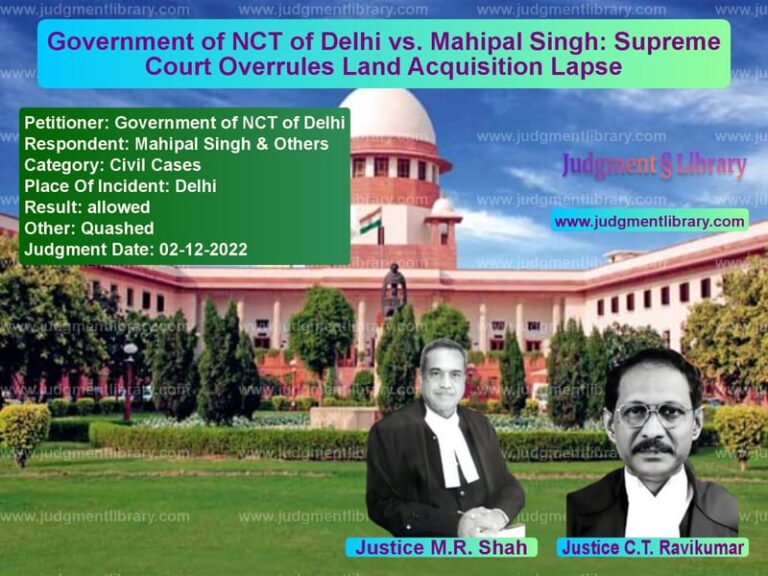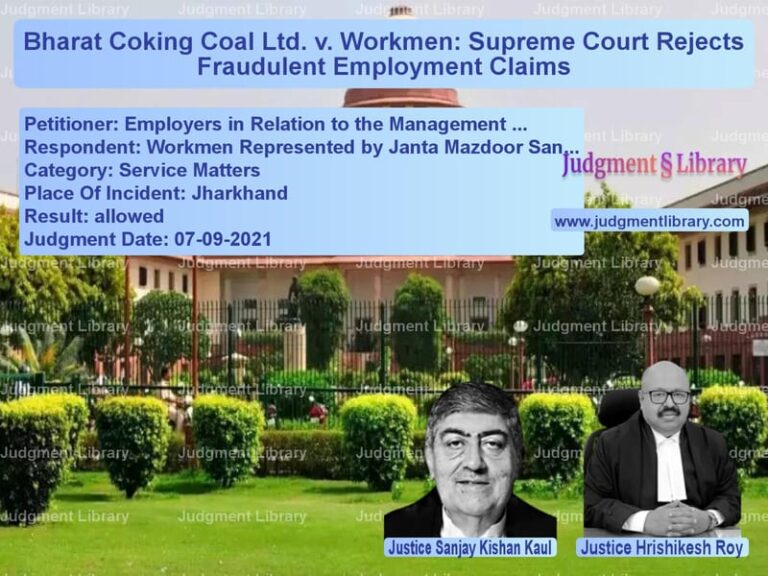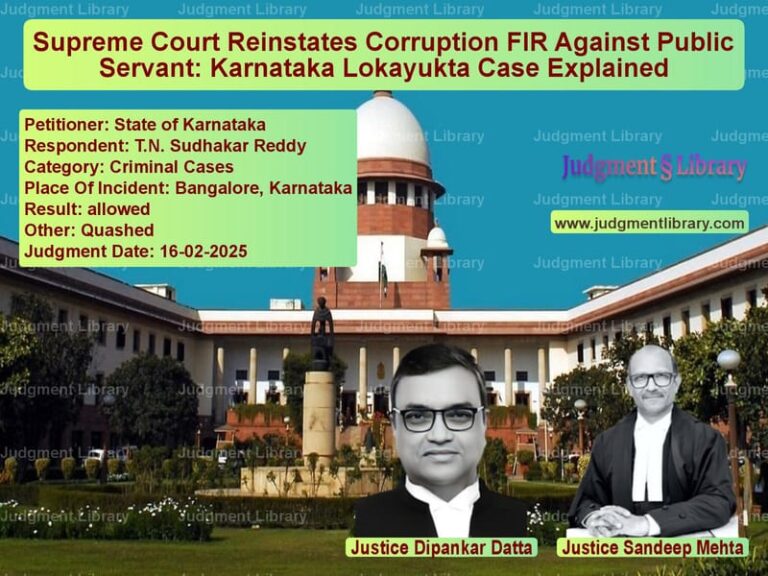Specific Performance of Contracts: Supreme Court Upholds Plaintiff’s Right in Property Dispute
The case of Bhavyanath v. K.V. Balan (Dead) Through LRs. revolved around the enforcement of a property sale agreement, where the plaintiff sought specific performance. The dispute primarily centered on whether the plaintiff had the financial capacity and readiness to fulfill his obligations under the contract. The Supreme Court, in its ruling, examined the principles of contract law and the doctrine of specific performance under the Specific Relief Act, 1963.
The appeal was filed against the judgment of the Kerala High Court, which had set aside the trial court’s decree in favor of the plaintiff. The Supreme Court reinstated the trial court’s decision, emphasizing that a buyer in a contract for sale need not have cash in hand but must demonstrate the financial ability to fulfill contractual obligations.
Background and Key Issues
The dispute arose from a sale agreement executed on April 25, 2007, where the plaintiff agreed to purchase 75 ¾ cents of land from the defendant. The agreed price was Rs. 34,000 per cent, and an initial payment of Rs. 2,00,000 was made. The plaintiff later paid another Rs. 3,00,000, as endorsed in the agreement. The contract specified that the balance payment had to be made by March 24, 2008.
The plaintiff claimed that he was ready and willing to perform his obligations, but the defendant failed to measure the land and provide clear title documents. When the sale was not executed, the plaintiff approached the court for specific performance.
Arguments of the Petitioner (Bhavyanath)
The petitioner contended:
- He had the financial capacity to complete the purchase and had arranged funds through family resources.
- The defendant failed to measure the land and clarify title issues before the sale deadline.
- On March 24, 2008, he was present at the Sub-Registrar’s office, ready to execute the deed, but the defendant was unavailable.
- The trial court correctly found that the defendant breached the contract by not fulfilling pre-sale obligations.
Arguments of the Respondent (K.V. Balan’s Legal Representatives)
The respondents countered:
- The plaintiff lacked financial readiness as he did not provide evidence of funds before the suit was filed.
- The agreement stipulated a strict time limit, which had expired, making the contract unenforceable.
- The land measurement was completed before the deadline, fulfilling the defendant’s obligations.
- The plaintiff attempted to resell the property to third parties, indicating his intent to profit rather than genuinely execute the purchase.
Key Observations of the Supreme Court
The Supreme Court analyzed the evidence and made the following crucial observations:
“A buyer in a contract for sale does not need to carry the full balance amount in cash at all times but must demonstrate financial capacity and willingness to fulfill the contract.”
“The plaintiff had arranged funds through family resources, and the absence of immediate cash does not negate readiness and willingness under Section 16(c) of the Specific Relief Act.”
The Court rejected the High Court’s reasoning that the plaintiff failed to prove financial readiness. It pointed out that the plaintiff had:
- Gold worth Rs. 24,00,000, verified through a government valuer.
- Cash reserves of Rs. 8,00,000, as stated in his deposition.
- Family-owned properties that could be leveraged for funds.
- Already paid a significant advance, indicating his commitment to the contract.
Land Measurement and Title Dispute
The Court noted that the contract required land measurement before execution. However:
- The defendant had not ensured measurement until March 16, 2008, just days before the deadline.
- The land was found to be 71.70 cents instead of the agreed 75 ¾ cents, raising concerns about title clarity.
- Documents revealed an old mortgage on the land, which the defendant had not cleared before the transaction.
Given these facts, the Supreme Court concluded that the defendant was in breach of the contract.
Final Judgment
The Supreme Court reinstated the trial court’s decree and granted specific performance, directing:
- The sale be executed in favor of the plaintiff.
- The plaintiff pay the balance amount of Rs. 19,37,800 (which had already been deposited in the Government Treasury).
- The plaintiff pay 6% interest on the balance amount from March 27, 2008, until the date of deposit.
Impact of the Judgment
The ruling reinforces critical principles of contract law and specific performance:
- Readiness and Willingness: A plaintiff must demonstrate financial capacity, but immediate possession of cash is not mandatory.
- Defendant’s Obligations: A seller must fulfill pre-sale obligations, including land measurement and title clearance.
- Fairness in Enforcement: Courts will not allow technical lapses or minor delays to defeat a valid contract where the buyer is genuinely ready to perform.
This decision strengthens the legal position of buyers seeking specific performance, ensuring that contractual obligations are enforced fairly and equitably.
Petitioner Name: Bhavyanath.Respondent Name: K.V. Balan (Dead) Through LRs.Judgment By: Justice Ashok Bhushan, Justice K.M. Joseph.Place Of Incident: Kerala.Judgment Date: 12-09-2019.
Don’t miss out on the full details! Download the complete judgment in PDF format below and gain valuable insights instantly!
Download Judgment: Bhavyanath vs K.V. Balan (Dead) Th Supreme Court of India Judgment Dated 12-09-2019.pdf
Direct Downlaod Judgment: Direct downlaod this Judgment
See all petitions in Specific Performance
See all petitions in Property Disputes
See all petitions in Judgment by Ashok Bhushan
See all petitions in Judgment by K.M. Joseph
See all petitions in allowed
See all petitions in supreme court of India judgments September 2019
See all petitions in 2019 judgments
See all posts in Civil Cases Category
See all allowed petitions in Civil Cases Category
See all Dismissed petitions in Civil Cases Category
See all partially allowed petitions in Civil Cases Category







